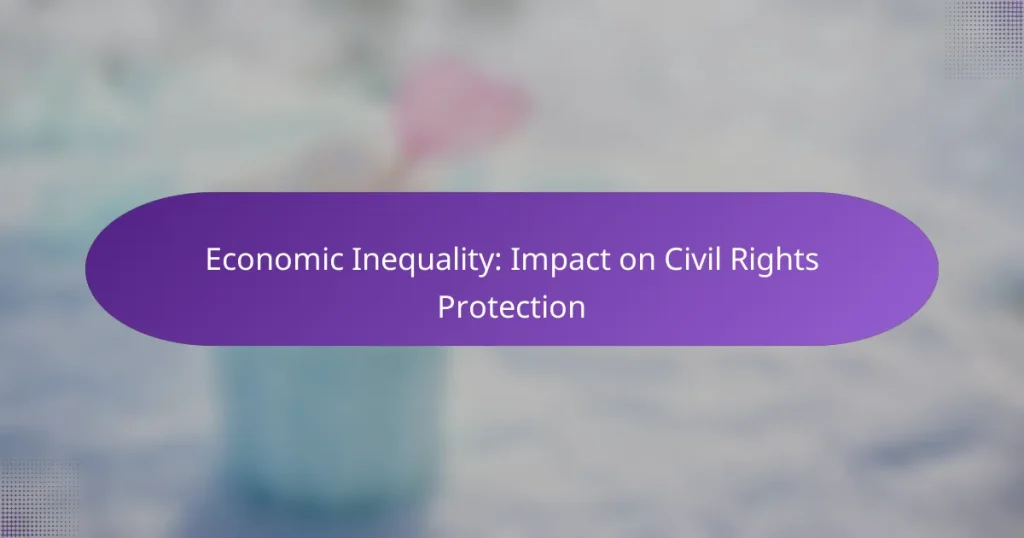Economic inequality poses a significant threat to civil rights protection, as it creates barriers to access essential resources and opportunities for marginalized communities. This disparity often results in systemic discrimination and inadequate legal support, highlighting the urgent need for effective strategies to address these issues and promote equitable access for all citizens.
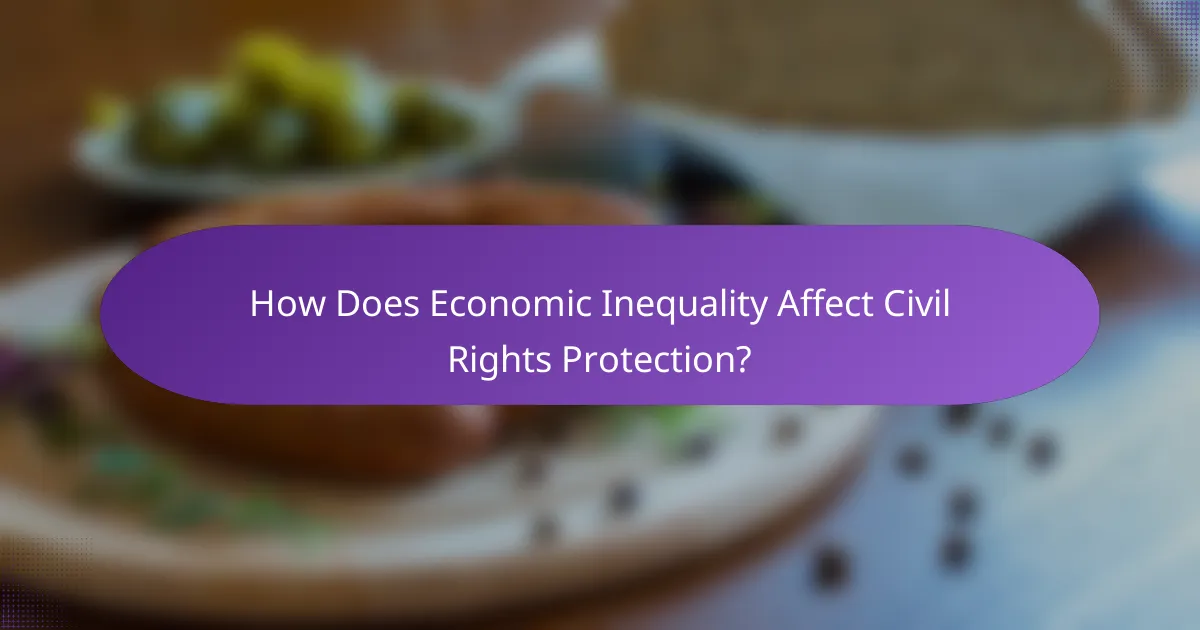
How Does Economic Inequality Affect Civil Rights Protection?
Economic inequality significantly undermines civil rights protection by creating disparities in access to resources and opportunities. This imbalance often leads to systemic discrimination and diminished legal support for marginalized communities.
Increased Discrimination
Economic inequality can exacerbate discrimination against low-income individuals and marginalized groups. When resources are scarce, those in power may prioritize their interests, leading to biased policies and practices that disproportionately affect disadvantaged populations.
For example, in employment, individuals from lower socioeconomic backgrounds may face hiring biases based on their economic status, limiting their job opportunities. This discrimination can perpetuate a cycle of poverty and inequality, further entrenching civil rights violations.
Reduced Access to Legal Resources
Economic inequality often results in reduced access to legal resources, making it difficult for individuals to defend their civil rights. Those with limited financial means may struggle to afford legal representation, which is crucial for navigating complex legal systems.
In many regions, public defenders are overburdened, leading to inadequate legal support for low-income individuals. This lack of access can prevent them from pursuing justice in cases of discrimination or civil rights abuses, leaving them vulnerable to exploitation.
Impact on Voting Rights
Economic inequality can significantly impact voting rights, as marginalized communities may face barriers that prevent them from participating in elections. Factors such as voter ID laws, limited access to polling places, and misinformation can disproportionately affect low-income voters.
For instance, individuals with unstable jobs may find it challenging to take time off to vote, especially if they lack transportation or face long distances to polling locations. This disenfranchisement can skew electoral outcomes and weaken the representation of economically disadvantaged groups in government.
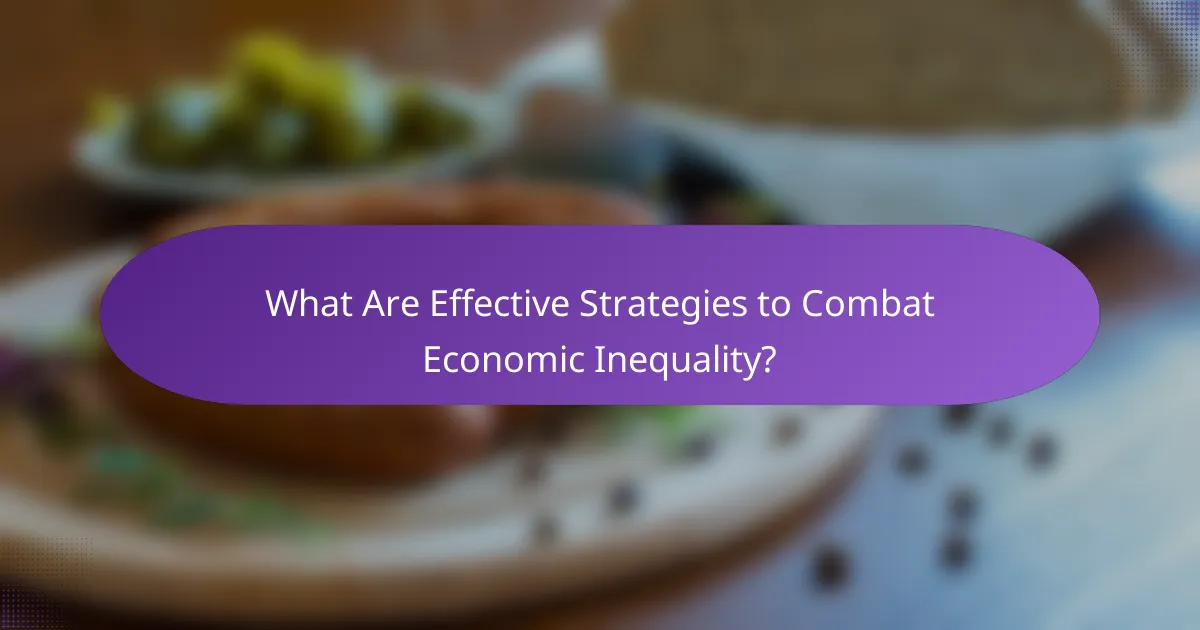
What Are Effective Strategies to Combat Economic Inequality?
Effective strategies to combat economic inequality include implementing progressive taxation, establishing universal basic income, and promoting affordable housing initiatives. These approaches aim to redistribute wealth, provide financial security, and ensure access to essential resources for all citizens.
Progressive Taxation
Progressive taxation involves taxing higher income earners at increased rates compared to lower income individuals. This system aims to reduce income disparity by ensuring that those with greater financial means contribute a fair share to public services and social programs.
For example, many countries implement tax brackets where income above certain thresholds is taxed at higher rates. This method can help fund education, healthcare, and infrastructure, ultimately benefiting lower-income communities.
Universal Basic Income
Universal Basic Income (UBI) provides all citizens with a regular, unconditional payment to cover basic living expenses. This strategy aims to alleviate poverty and provide financial stability, allowing individuals to pursue education or entrepreneurship without the constant pressure of financial insecurity.
Countries like Finland have experimented with UBI, finding that it can improve mental well-being and encourage job-seeking behavior. While the implementation of UBI requires substantial funding, it can be supported through progressive taxation or reallocating existing welfare budgets.
Affordable Housing Initiatives
Affordable housing initiatives focus on increasing the availability of housing options that are financially accessible to low- and middle-income families. These programs can include subsidies, rent control, and the construction of public housing to ensure that everyone has a safe place to live.
For instance, cities may implement zoning changes to allow for more mixed-income developments or provide tax incentives for developers who include affordable units in their projects. Such initiatives not only help reduce economic inequality but also foster diverse communities and stimulate local economies.
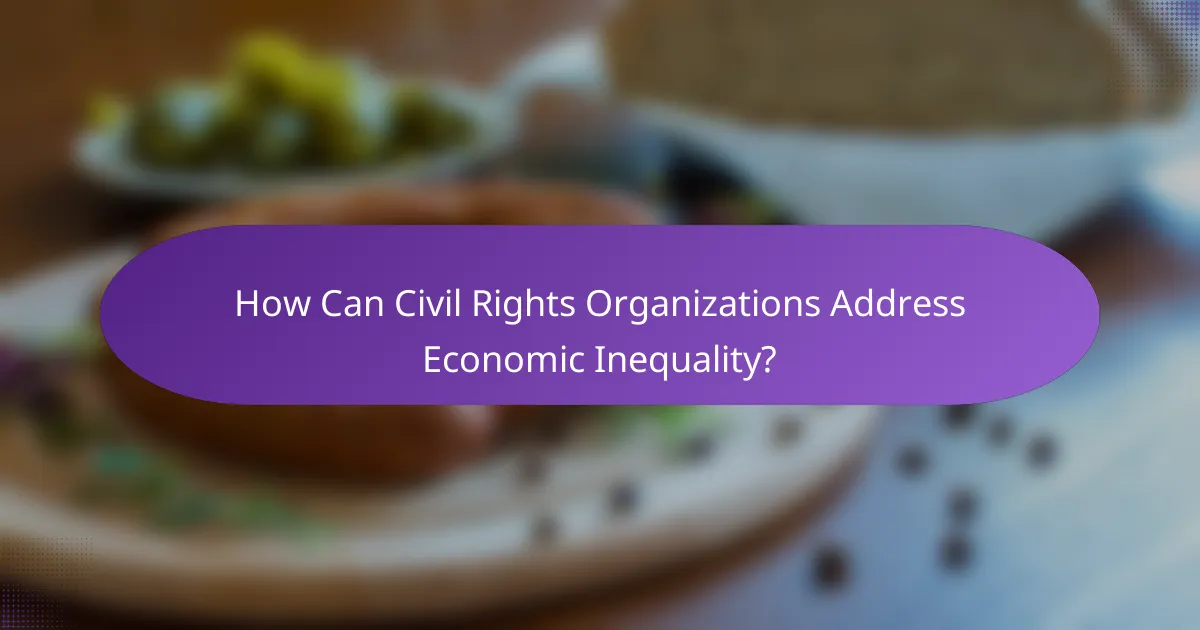
How Can Civil Rights Organizations Address Economic Inequality?
Civil rights organizations can tackle economic inequality by advocating for systemic policy changes and implementing community education programs. These strategies aim to empower marginalized groups and promote equitable access to resources and opportunities.
Advocacy for Policy Change
Advocacy for policy change involves lobbying for legislation that addresses economic disparities. Organizations can focus on reforms in areas such as minimum wage laws, affordable housing, and access to healthcare, which directly impact low-income communities.
To be effective, civil rights groups should build coalitions with other organizations and stakeholders. This collaborative approach can amplify their voice and increase the chances of influencing policymakers. Engaging in grassroots campaigns and public awareness initiatives can also help mobilize community support.
Community Education Programs
Community education programs aim to inform individuals about their rights and available resources. These programs can cover topics such as financial literacy, job training, and legal rights, empowering participants to navigate economic challenges more effectively.
Organizations should tailor their educational efforts to meet the specific needs of the communities they serve. For example, workshops on budgeting and saving can help families manage their finances better, while training sessions on job skills can enhance employability. Providing resources in multiple languages can further ensure inclusivity.
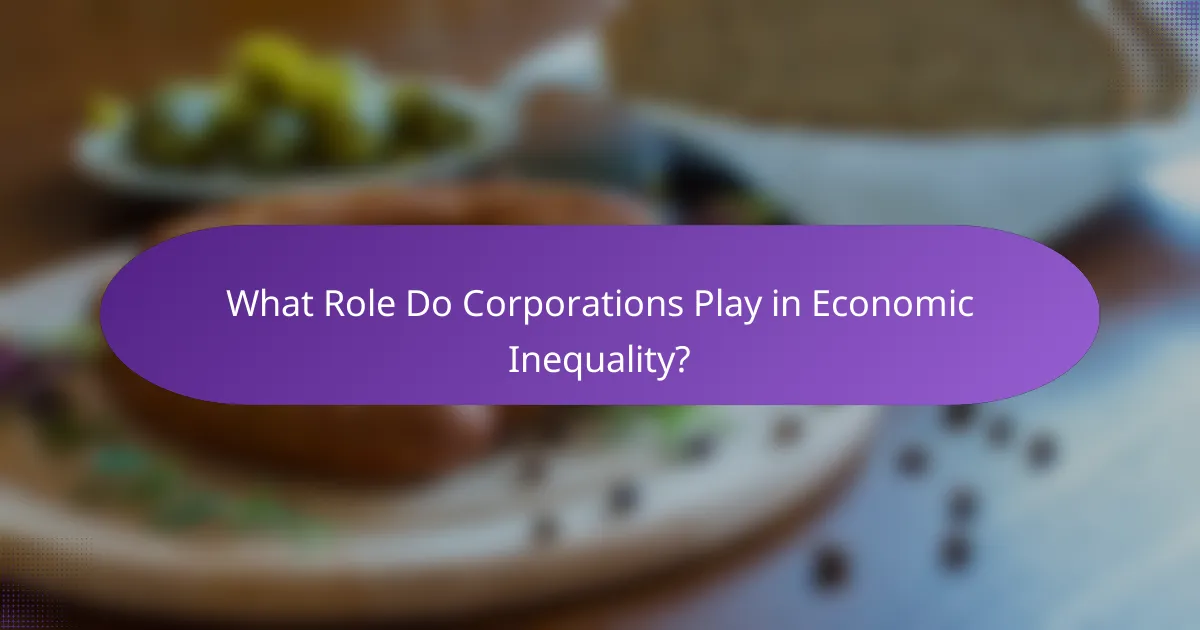
What Role Do Corporations Play in Economic Inequality?
Corporations significantly influence economic inequality through their business practices, compensation structures, and community engagement. Their decisions regarding wages, benefits, and corporate social responsibility can either mitigate or exacerbate disparities in wealth and access to resources.
Corporate Social Responsibility Initiatives
Corporate social responsibility (CSR) initiatives are programs that companies implement to contribute positively to society. These initiatives can include environmental sustainability efforts, community development projects, and support for education and health programs. When executed effectively, CSR can help bridge the gap between wealth and opportunity, fostering a more equitable society.
However, the impact of CSR varies widely among corporations. Some companies may engage in superficial CSR efforts that serve primarily as marketing tools, while others invest significantly in long-term community benefits. It’s crucial for consumers and stakeholders to assess the authenticity and effectiveness of these initiatives.
Wage Disparities and Labor Rights
Wage disparities are a critical aspect of economic inequality, often resulting from corporate pay structures that favor executives over average workers. In many industries, the gap between CEO compensation and median employee wages can be substantial, sometimes exceeding hundreds of times. This imbalance not only affects individual livelihoods but also contributes to broader societal inequalities.
Labor rights play a vital role in addressing wage disparities. Strong labor protections, including minimum wage laws and collective bargaining rights, can empower workers to negotiate fair compensation. Countries with robust labor regulations tend to have lower levels of economic inequality, highlighting the importance of supporting labor rights as a means to promote equity.
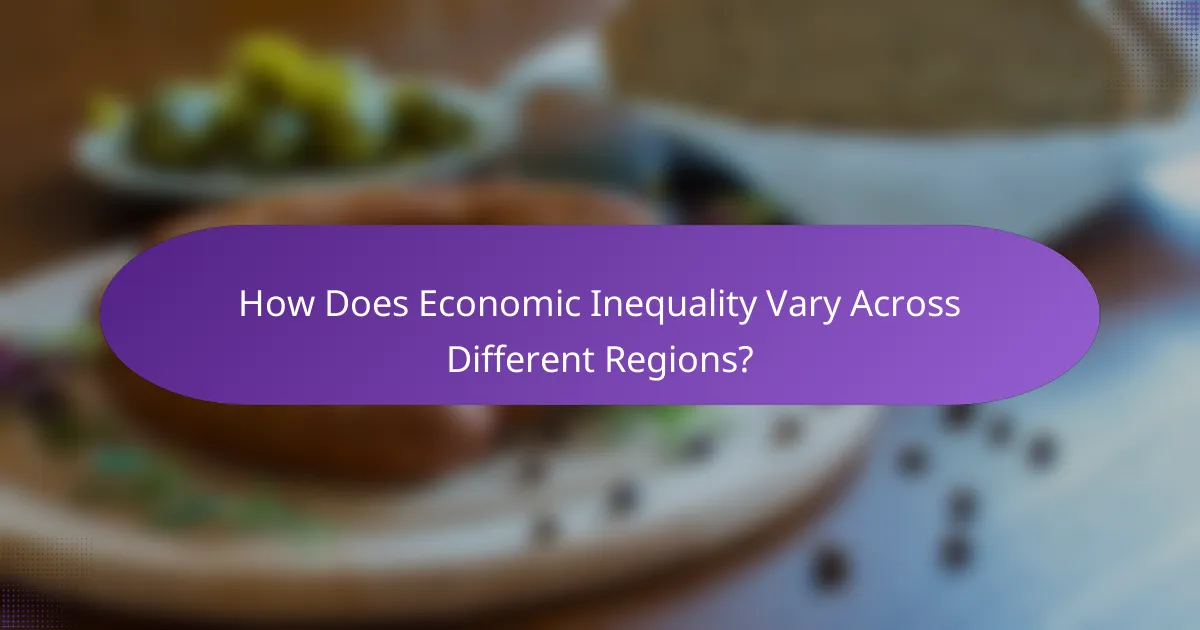
How Does Economic Inequality Vary Across Different Regions?
Economic inequality varies significantly across regions, influenced by factors such as local economies, employment opportunities, and access to education. Urban areas often experience different levels of inequality compared to rural regions, which can affect civil rights protections and access to resources.
Urban vs. Rural Disparities
Urban areas typically exhibit higher levels of economic inequality due to concentrated wealth and diverse job markets. In contrast, rural regions may face lower overall inequality but struggle with limited economic opportunities and access to essential services.
For instance, cities like San Francisco or New York showcase stark income gaps, with affluent neighborhoods adjacent to low-income areas. Rural communities, while more homogenous in income, often lack infrastructure and resources, leading to disparities in education and healthcare access.
State-Specific Economic Policies
Economic policies at the state level can significantly influence inequality. States with progressive tax structures and robust social programs tend to mitigate economic disparities more effectively than those with regressive policies.
For example, states like California implement higher taxes on the wealthy and invest in public services, which can help reduce inequality. Conversely, states with lower taxes and fewer social safety nets may exacerbate economic divides, impacting civil rights protections for marginalized groups.
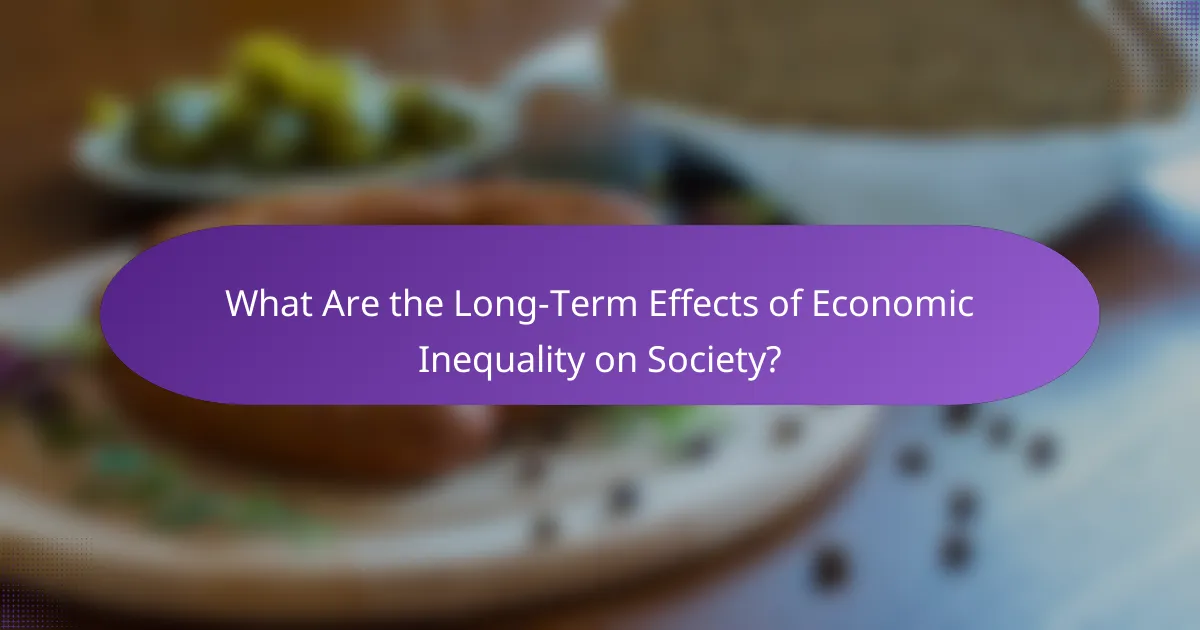
What Are the Long-Term Effects of Economic Inequality on Society?
Economic inequality can lead to significant long-term effects on society, including social unrest, diminished access to education, and poorer health outcomes. These consequences can create a cycle of disadvantage that is difficult to break, impacting both individuals and communities.
Social Unrest and Instability
Economic inequality often breeds social unrest and instability as marginalized groups feel excluded from opportunities and resources. This discontent can manifest in protests, riots, and increased crime rates, as individuals seek to voice their grievances.
Communities with high levels of inequality may experience a breakdown in social cohesion, leading to divisions along class lines. This can result in a lack of trust in institutions and governance, further exacerbating tensions and instability.
Impact on Education and Health Outcomes
Economic inequality significantly affects access to quality education and healthcare, which are crucial for upward mobility. Families with limited financial resources often struggle to afford educational expenses, leading to lower academic achievement and fewer opportunities for advancement.
Health outcomes are similarly impacted, as lower-income individuals may lack access to nutritious food, safe housing, and adequate medical care. This can result in higher rates of chronic illnesses and lower life expectancy, perpetuating the cycle of inequality.
